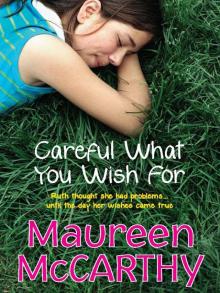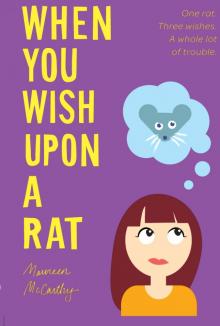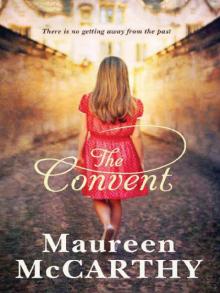- Home
- Maureen McCarthy
Queen Kat, Carmel and St Jude Get a Life
Queen Kat, Carmel and St Jude Get a Life Read online
Praise for
QUEEN KAT, CARMEL
AND ST JUDE GET A LIFE
‘Maureen McCarthy’s books are hewn from her own soul. It’s an incredibly generous gift, and I’m so grateful!’
Alyssa Brugman
‘Queen Kat, Carmel and St Jude Get a Life made me want to do more than disappear into another world. It made me want to make my own.’
Cath Crowley
‘I was 21 when I read Queen Kat, Carmel and St Jude Get a Life. It was the year I’d moved to Melbourne from Hobart. Like the three girls of the novel I was negotiating a vibrant new city, university, share-housing, employment, politics and the complexities of my own desires, ambitions and expectations. For me Maureen McCarthy perfectly captured the ambivalence and ecstasy of independence and autonomy in young adulthood and I related to all three characters – beautiful, brittle Katrina, fiercely idealistic Jude and, perhaps best of all, shy parochial Carmel, emerging from her shell. This is one of those books that is intrinsically tied to the folklore of myself, an era of my life that is over now but always treasured.’
Penni Russon
‘I first read Queen Kat, Carmel and St Jude Get a Life when I was fourteen, and felt like I was reading my own future. I caught tantalising glimpses of adulthood and independence, and could see myself attending lectures at Melbourne Uni with Jude, visiting cafes on Brunswick Street with Kat, and having heart-to-hearts with Carmel on Canning Street. I loved the idea that you could write a book set in Melbourne – not London, or New York, or Narnia – but Melbourne. My Melbourne. The lives and relationships of these three girls felt so real to me that even today it’s hard not to look them up on Facebook to see what they’re up to. I heard Maureen talk about Queen Kat, Carmel and St Jude Get a Life at a Bookgig in 1995, and was in awe. “I want that to be me one day,” I thought. “Up there, talking about my books. I want to be like her.” I’m still trying.’
Lili Wilkinson
‘This book burrowed into my heart and stayed there. It’s blissfully perfect.’
Kate Gordon
QUEEN KAT,
CARMEL
AND ST JUDE
GET A LIFE
MAUREEN
McCARTHY
This edition first published in 2012
First published by Penguin Books Australia, 1995
Copyright © Maureen McCarthy, 1995
All rights reserved. No part of this book may be reproduced or transmitted in any form or by any means, electronic or mechanical, including photocopying, recording or by any information storage and retrieval system, without prior permission in writing from the publisher. The Australian Copyright Act 1968 (the Act) allows a maximum of one chapter or ten per cent of this book, whichever is the greater, to be photocopied by any educational institution for its educational purposes provided that the educational institution (or body that administers it) has given a remuneration notice to Copyright Agency Limited (CAL) under the Act.
Allen & Unwin
83 Alexander Street | Crows Nest NSW 2065 | Australia
Phone: (61 2) 8425 0100 | Fax: (61 2) 9906 2218
Email: [email protected] | Web: www.allenandunwin.com
A Cataloguing-in-Publication entry is available from the
National Library of Australia: www.trove.nla.gov.au
ISBN 9 781 74237 951 7
The quotation on page page 255 is reprinted with permission from
Gray’s Anatomy, © 1974 Running Press Book Publishers, Philadelphia
Cover and text design by Bruno Herfst
Set in 10.4 pt Times by ToolBox
Printed in Australia by McPhersons’s Printing Group
This one is for Joe,
strong and wild and
full of surprises.
CONTENTS
MANELLA – DECEMBER
CARMEL
JUDE
KATERINA
MANELLA – OCTOBER
MANELLA – DECEMBER
‘KATERINA, YOU HAVE A CH OICE. UNIVERSITY college or a room with your sister. That’s final!’
‘Well, I won’t live with her!’
‘Then it’s college.’
‘Daddy, I’ve had six years of boarding school. I’m eighteen for God’s sake!’
‘Then it’s a room with Louise.’
Katerina took one slim, finely manicured hand out from under the vase she’d been about to fill with her mother’s flowers – a lovely smelly heap of white and lilac roses – and deliberately let it slide from her grip. The vase, an antique, made of opaque Waterford crystal which had originally belonged to her grandmother, smashed onto the parquetry floor and sprayed dramatically into a thousand tiny pieces of blue. There was a restrained gasp from her mother and an angry snort from her father. Shocked, the three of them stared mutely at the blue-speckled floor.
It was the last straw for Dr Albert Armstrong. He turned his back to his daughter and snapped the lid of his briefcase down. ‘You clumsy girl!’
‘It was an accident,’ Katerina said defensively. Her father grunted, as though he didn’t believe her but had better things to think about.
He stepped towards his wife and kissed her brusquely on the cheek.
‘I’ll be home at the usual time, dear.’
‘Yes, dear.’
He then turned to Katerina, who was still staring at the tiny pieces of glass spread over the floor.
‘Try to be a help to your mother today, please, Katerina. Don’t be worrying her about . . . anything.’
He didn’t wait for her to reply, but strode out the door, closing it stiffly behind him. Katerina looked up, following his retreating shape through the beautiful red and green lead-light door leading out into the hall, and wondered why she’d dropped the vase. After all, although she’d given this accommodation business her best shot, she hadn’t seriously expected to win. She was only eighteen and the main round had been won before the results had come out. That one she’d really insisted on. She wouldn’t, simply couldn’t, live in a university college. Thankfully, they’d conceded on that one. Just the thought of more institutional food, of lectures and meals with groups of hearty, giggling girls with bad skin, who talked loudly, dressed carelessly . . . and all their drippy, splotchy-faced boyfriends. Katerina had had enough of that kind of living to last a lifetime.
Although it would be another month before she would receive confirmation of a place in Law at Melbourne University, her excellent results assured her that there had never been any doubt. She’d won dux of her prestigious girls’ school, plus the French prize and the maths prize.
As she turned regretfully to the broken vase she was reminded of the bitter fight she’d had with her best friend Claire only three months before the end of term.
‘You think it’s okay to just step on people, don’t you, Katerina?’
‘What?’ Katerina had been shocked. ‘Claire, I simply don’t want that dreary girl to come!’ That it had been over such a trivial matter made it doubly hard to understand. Claire had suggested inviting some boring girl, whose father had recently carked it, to join them for a day down at Portsea. The girl was a shy, plain, moping type who couldn’t even play tennis. She would poison their one free day for sure. How was Katerina to know that her friend would build this disagreement into a raging row?
‘You would never consider what she might be going through, would you?’
‘What do you mean? What do we owe her?’ But Claire refused to explain herself any further.
‘Get a life, Katerina!’ she’d yelled over her shoulder before storming off. ‘Just piss off why don’t you and get a bloody life!’
‘Why don�
�t you?’ Katerina had called lamely after her, feeling suddenly sick with remorse and incomprehension. What had she done? It was like now in front of this broken vase. Why did I do this? Claire had been her best friend. They’d laughed together, plotted their futures, told secrets. But in spite of mutual apologies when Claire arrived back at school that evening, their closeness had ended with that horrible argument. Of course there was the rest of the crowd, Kara in particular, who’d stepped in to fill the gap. But losing Claire’s friendship hurt more than Katerina was prepared to admit.
So she would live with her big sister Louise for a year. Never mind. Louise would be in fifth-year Medicine next year. Long hours working in the hospitals, as well as being stuck away every night with her books. With a bit of luck they wouldn’t see each other from one week to the next.
‘My dear . . . I t’s spoiling everything, you being like this. Your results were so brilliant. Daddy and I are both so proud. I just wish you wouldn’t argue so much.’
Katerina looked up, a little surprised at her mother’s voice. She’d forgotten about her even being there. And here she was in the watery-green silk dress that matched her eyes, a slightly surprised, harassed look lining her face. Katerina wondered for perhaps the twentieth time that week what she would have to do to make her really mad. Her mother especially valued that blue vase . . . she knew it. It was a beautiful thing. Katerina was ashamed she’d broken it. Yet her mother had simply stood watching, as usual. Watching while her husband and daughter slugged it out. Contained and serene as ever. Why didn’t that woman ever do anything?
‘I’m sorry, Mum. About the vase, too. It was . . . careless of me.’
Her mother nodded and sighed again.
‘Well, I do . . . we both . . . want you to try to accept the situation.’
Katerina knew her mother was a nice person. A lovely person. Everyone who’d ever met her said so. She was good-looking, refined, warm when she wanted to be, and kind to just about everyone she met. She never seemed to get angry, hardly ever complained. The perfect country surgeon’s wife. Katerina tried to remember all the good points about her mother at the same time as imagining walking over and slapping her nicely preserved face very hard on both cheeks. She couldn’t help it. It wasn’t so much that her mother agreed with everything her father said. It was the way she agreed. So damned . . . demure. You never got the impression she thought anything apart from what he told her to think. Or had any ideas apart from his. Katerina walked into the pantry and looked around for the dustpan and brush.
‘Darling, you did remember that the Crossways are coming for dinner tonight?’
Katerina swallowed her desire to let out a shriek in the small dark room neatly lined with tins and bottles of fruit and packets of dried food. Instead she pushed her head around the door and gave her mother a curt nod. The Crossways were her parents’ best friends. Her father had studied Medicine at university with Neil Crossway eons ago, and the family lived in Yassfield, a small town about twenty kilometres from the Armstrongs. The two men were the district’s most senior doctors, they shared work in the same hospital and often rang each other to confer about patients. The Crossways’ only son Anton had finished his fourth year of Law the year before and was now doing his articles with a city firm. Katerina knew that this visit had been arranged on her behalf, that her mother and father thought it a good idea to reacquaint their daughter with Anton so she would know someone when she first went to the city. Someone nice who, in turn, would introduce her to other nice people.
Having located the dustpan and brush, she walked over to the shattered vase and knelt down. The damn thing had spread its tiny pieces into the furthest reaches of the kitchen.
‘Do I have to be here?’ she grumbled, knowing that she did. ‘Oh darling, of course you do.’ Her mother sounded genuinely hurt. ‘Anton is coming. We thought it might be nice for you to know someone in the city when you arrive.’
Katerina began sweeping.
‘Mum. Half my year at school will be there . . . I ’ll know heaps.’ ‘I know, darling. But Anton will know the ropes. And he’s someone from home, too.’
Katerina knew her mother really meant someone like us. Someone from the right kind of family, with plenty of money and the right social connections. Her mother felt a barely contained horror at the thought of either of her children mixing with people who weren’t the right sort.
The Crossways were loaded. Not only was old Neil a top-earning doctor, but he’d inherited his father’s family farm as well: about three thousand hectares of lush Victorian cattle-grazing country. He employed a manager, of course, who lived on the property and looked after it all, as well as locals for seasonal work. Katerina hadn’t seen Anton for about three years, but remembered him as nice enough; a bit shy and rather good-looking. Katerina smiled to herself as she remembered his diffident tone when she’d asked him a few years ago what he did for fun at uni. He’d only been eighteen then and fairly gauche. He was probably breaking hearts all over the city by this stage. But so what? Whatever he was doing didn’t interest her in the least. There was no way she intended seeking out the sons of old family friends for contacts when she hit town. That sort of thing was for people who didn’t know who they were, who had no confidence in themselves, no plans. She would be perfectly capable on her own.
Katerina swept up most of the glass. There was no point looking too carefully under the table or moving anything. Maria would come later and she actually seemed to like doing the household tasks she was paid to do.
‘Okay. Okay. I’ll be here,’ Katerina sighed, as she moved over to look out of the kitchen window onto the patio and lush backyard. Her family home was a rambling, beautifully restored Edwardian house set on the highest hill above the main street of the busy country town of Manella. The many big trees sheltered the garden from any neighbouring houses or roads. Except for the birds, all was quiet. The garden sloped slightly down to the back fence, which was lined with enormous liquidambars and maples, all green and yellow shade now, rustling in the foul north wind.
Katerina could see the old rope hanging down from what used to be her branch on her favourite tree in the corner. The hours she and Louise used to put in down there, hiding from each other in their separate trees, swinging on the rope, pretending they were world-class gymnasts or female Tarzans. A perfect childhood. Until the day her elder sister – her hero, best friend and constant companion – had been wrenched away from her. Well, that’s how it had felt anyway. Sent off to boarding school at fourteen, when Katerina had been only ten. That first year of being the only child in the big house was the worst time Katerina could remember. Waking up every morning with Louise gone was like being cut each day in the same spot. Life, which until then had been wonderful, full of jokes, excitement and interesting plans with Louise, became simply a matter of filling in time until Lou-Lou could come back. It was a much worse feeling than her own first year at boarding school, because by then she’d learnt to rely on herself and not to care.
Of course her sister had come home for weekends and holidays, but things were never the same between them. The truth was that Louise hadn’t missed her little sister much at all. This was obvious the first weekend she came home, and it had been a bitter pill for the ten-year-old Katerina to swallow. Her sister had made new friends, had new ways of looking at things. She wasn’t interested in the old games any more.
Katerina sighed again when she noticed the leaves from the sugar gum swirling around in the swimming pool. Her father had asked her to clean it out yesterday, but she’d forgotten. The high sun shone down onto the iridescent blue water, making a stinging brightness so different from the muted, easy tones of the surrounding trees. She would have a swim later, but not before that wind had subsided.
‘Don’t be upset, dear,’ her mother said, mistaking her sombre musing for further sulking about the housing issue. Surprised by the concerned voice, Katerina turned around to face her mother with a dazzling smile.
&
nbsp; ‘I’m not, Mum, really.’ Katerina took her arm. The relief on her mother’s face made her feel slightly queasy. Katerina vowed for the millionth time never to get herself into her mother’s situation. Never. Never will I be dependent on other people for how I feel about myself. About anything. I will never be at someone else’s mercy.
‘Don’t worry, Mum. It’ll be fine.’
Her mother pulled her briefly against the cool green silk of her breast and whispered into her hair.
‘You sure?’
‘Of course.’
Katerina was really just a younger version of her mother. They shared the same lightly tanned, creamy skin, the fair curly hair, and the green eyes. Both were slender and straight with well-proportioned figures and dainty hands and feet. The older woman, almost fifty now, was entering middle age gracefully, the tiny crow’s-feet around her eyes and the slight greying of her hair adding to her charm and dignified beauty. Katerina had the same grace and charm about her body, but her face, although very similar to her mother’s, was livelier. They were both beautiful. Katerina felt a sudden rush, an almost physical burst of gratitude towards the woman standing in front of her. There had been other attractive girls at her school, but they were, in the main, dark-haired, sultry types or brassy, cheap-looking blondes. Cute, perhaps, in a way. But the kind of looks that ultimately faded into mere prettiness. None of them, she knew, quite matched herself.
‘Mum, that green really suits you,’ Katerina said softly, pulling away from her mother’s embrace, but still holding her hand.
Mrs Armstrong gave a slight smile, then lowered her eyes.
‘I’m worried about you being in the city,’ she said. ‘You will take notice of your big sister, won’t you? Let her show you the ropes, and . . .’
‘Oh Mum! I’ll be fine!’ Katerina said impatiently. ‘Lou and I haven’t been . . . done things together for years!’
‘You’re my baby. And I am worried.’

 Careful What You Wish For
Careful What You Wish For When You Wish upon a Rat
When You Wish upon a Rat The Convent
The Convent Queen Kat, Carmel and St Jude Get a Life
Queen Kat, Carmel and St Jude Get a Life Rose by Any Other Name
Rose by Any Other Name